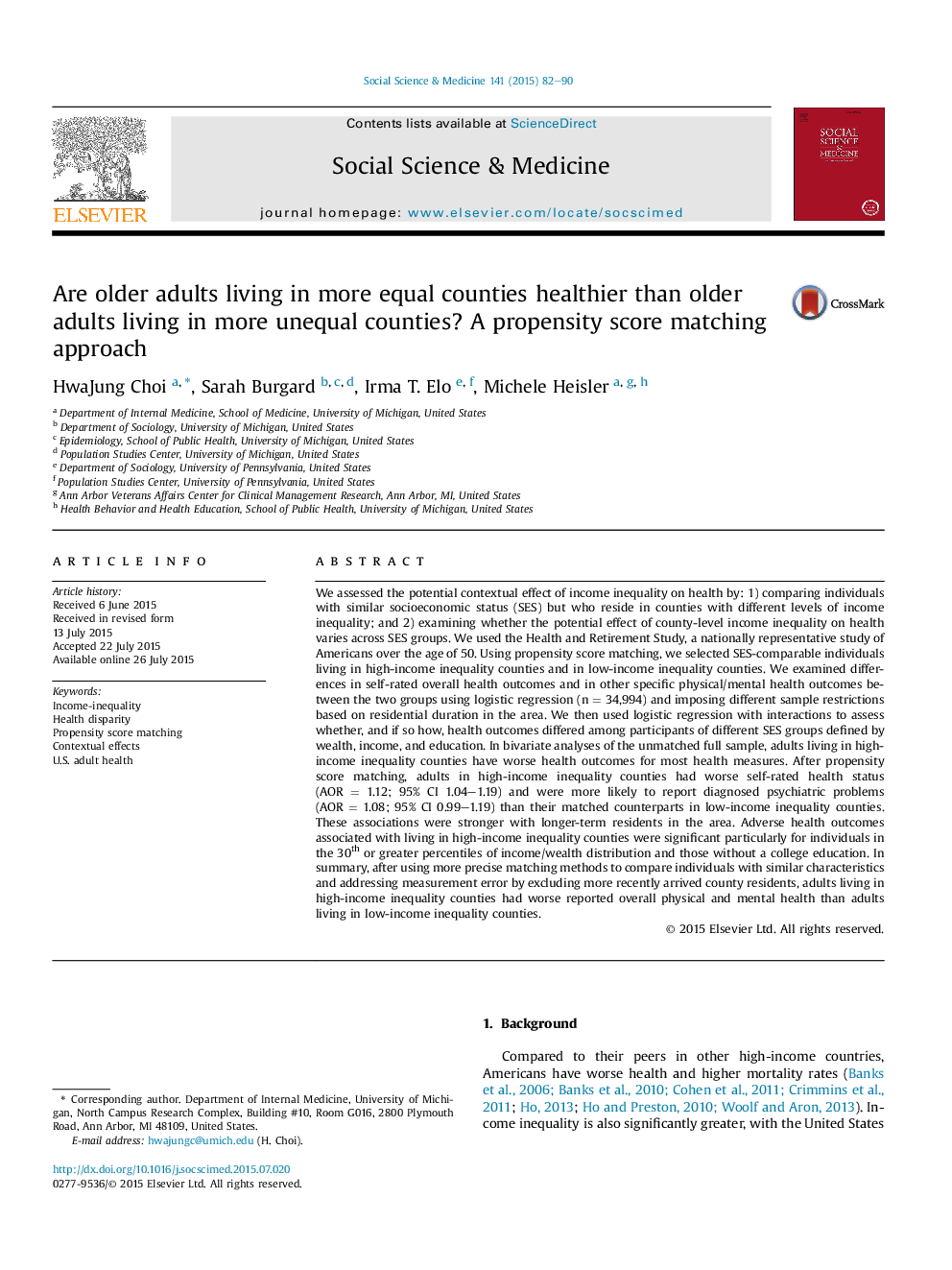| کد مقاله | کد نشریه | سال انتشار | مقاله انگلیسی | نسخه تمام متن |
|---|---|---|---|---|
| 7331892 | 1476028 | 2015 | 9 صفحه PDF | دانلود رایگان |
عنوان انگلیسی مقاله ISI
Are older adults living in more equal counties healthier than older adults living in more unequal counties? A propensity score matching approach
ترجمه فارسی عنوان
آیا بزرگسالان سالمند در مناطق برابر تر زندگی می کنند سالم تر از بزرگسالان سالمند که در مناطق نابرابر زندگی می کنند؟ معیار تساوی
دانلود مقاله + سفارش ترجمه
دانلود مقاله ISI انگلیسی
رایگان برای ایرانیان
کلمات کلیدی
درآمد نابرابری، تفاوت های بهداشتی، تطابق امتیاز تساهل، اثرات متنی، بهداشت بزرگسالان ایالات متحده،
موضوعات مرتبط
علوم پزشکی و سلامت
پزشکی و دندانپزشکی
سیاست های بهداشت و سلامت عمومی
چکیده انگلیسی
We assessed the potential contextual effect of income inequality on health by: 1) comparing individuals with similar socioeconomic status (SES) but who reside in counties with different levels of income inequality; and 2) examining whether the potential effect of county-level income inequality on health varies across SES groups. We used the Health and Retirement Study, a nationally representative study of Americans over the age of 50. Using propensity score matching, we selected SES-comparable individuals living in high-income inequality counties and in low-income inequality counties. We examined differences in self-rated overall health outcomes and in other specific physical/mental health outcomes between the two groups using logistic regression (n = 34,994) and imposing different sample restrictions based on residential duration in the area. We then used logistic regression with interactions to assess whether, and if so how, health outcomes differed among participants of different SES groups defined by wealth, income, and education. In bivariate analyses of the unmatched full sample, adults living in high-income inequality counties have worse health outcomes for most health measures. After propensity score matching, adults in high-income inequality counties had worse self-rated health status (AOR = 1.12; 95% CI 1.04-1.19) and were more likely to report diagnosed psychiatric problems (AOR = 1.08; 95% CI 0.99-1.19) than their matched counterparts in low-income inequality counties. These associations were stronger with longer-term residents in the area. Adverse health outcomes associated with living in high-income inequality counties were significant particularly for individuals in the 30th or greater percentiles of income/wealth distribution and those without a college education. In summary, after using more precise matching methods to compare individuals with similar characteristics and addressing measurement error by excluding more recently arrived county residents, adults living in high-income inequality counties had worse reported overall physical and mental health than adults living in low-income inequality counties.
ناشر
Database: Elsevier - ScienceDirect (ساینس دایرکت)
Journal: Social Science & Medicine - Volume 141, September 2015, Pages 82-90
Journal: Social Science & Medicine - Volume 141, September 2015, Pages 82-90
نویسندگان
HwaJung Choi, Sarah Burgard, Irma T. Elo, Michele Heisler,
